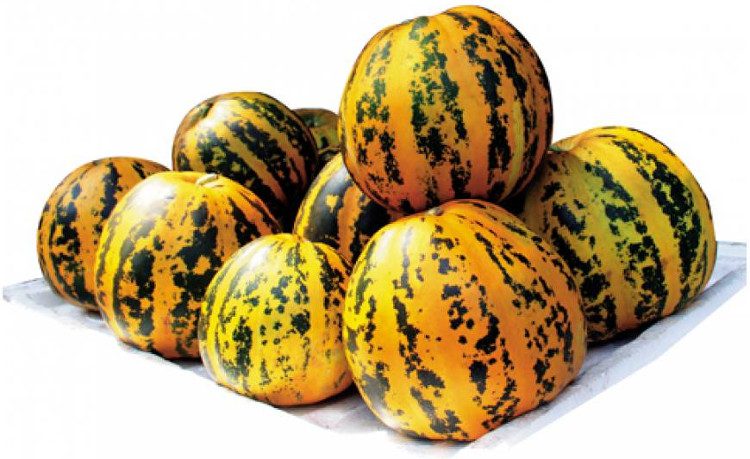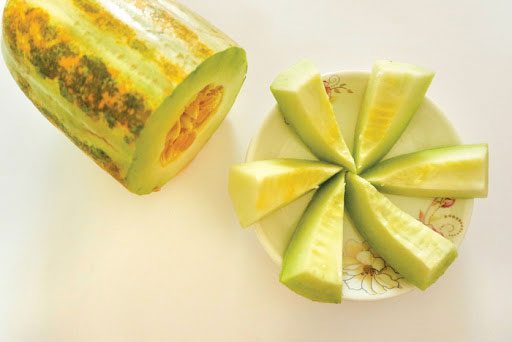Winter Melon is a nutritious fruit that is excellent for refreshing oneself during the hot summer and has many health benefits.
Not just a delicious treat, winter melon also possesses remarkable health benefits. According to Traditional Chinese Medicine, winter melon has a sweet taste and a cooling property, helping to quench thirst, alleviate discomfort, promote airflow, act as a diuretic, and can prevent heatstroke on hot summer days.
Nutritional composition per 100g includes 95% water, 0.60% protein, 0.11% fat, 3.72% carbohydrates, 0.33% fiber, and various vitamins (Vitamin A: 25 – 30,000 units, B: 0.03mg, C: 1.5 – 2mg) along with several minerals (Phosphorus: 30mg, Calcium: 20mg, Iron: 0.4mg).

Winter melon has many wonderful health effects.
The seeds of winter melon are sweet and cooling, helping to regulate the stomach, clear the lungs, relieve constipation, and treat various conditions like abdominal swelling or dry cough…
Winter melon flowers can treat hiccups and heart pain, while the leaves are beneficial for menstrual disorders in women. The stem has a bitter taste, is cold, and toxic, causing vomiting and promoting urination, detoxifying, and treating high fever and malaria…
Moreover, winter melon has the advantage of being 95% water, low in calories, and low in sugar. These features make it a great choice for those looking to lose weight or manage obesity. You can enjoy winter melon smoothies with a bit of sugar or mix them with dragon fruit for added benefits.
Winter melon is a nutritious fruit that is excellent for refreshing oneself during hot summer days. To alleviate heat, thirst, and urinary issues, you can consume 250g of winter melon, peeled, and eat the seeds. This remedy helps clear heat, produces fluids, and promotes urination.

Winter melon is a good food choice for those looking to lose weight.
The stem of the winter melon has a cold property, a bitter taste, and is toxic; it can induce vomiting, expelling retained substances from the stomach, and promote urination. Traditional Chinese Medicine since the Han Dynasty has utilized the stem of winter melon to induce vomiting to clear phlegm and undigested food from the stomach.
Modern medicine also confirms that the winter melon stem contains melotoxin, an important specific medicine that induces vomiting, promotes urination, and reduces jaundice.
Supports blood pressure and enhances cardiovascular health: A diet rich in fruits and vegetables is linked to a lower risk of hypertension and cardiovascular diseases. Specifically, winter melon has a high potassium content and low sodium, which can help maintain healthy blood pressure levels. Additionally, this fruit is a source of folate and other B vitamins that help lower homocysteine levels, associated with a reduced risk of stroke.
Helps improve blood sugar levels: Studies show that regularly eating fruits like winter melon can help improve blood sugar levels and reduce the risk of diabetes and related health complications. Even though they contain sugar, their fiber, water content, and other nutrients can help support long-term blood sugar control.
Supports vision and eye health: The effects of aging and sunlight can lead to eye problems such as cataracts and age-related macular degeneration. This progressive damage to delicate eye tissues can lead to vision loss over time. The green-fleshed winter melon contains two powerful antioxidants, lutein and zeaxanthin. These carotenoid compounds support eye health and prevent the development of age-related vision loss.

Green-fleshed winter melon contains two powerful antioxidants: lutein and zeaxanthin.
Replenishes electrolytes and hydration: In fact, hydration is not just about providing water to the body but also about supplying electrolytes. According to experts, winter melon contains 90% water along with a significant amount of electrolytes like potassium and magnesium. Therefore, you can use this fruit as a means to rehydrate after exercise or simply when feeling thirsty.
Enhances digestive health: Winter melon contains fiber that helps improve digestive health. Adequate fiber intake in the diet slows blood sugar increases, promotes normal bowel movements, and supports the growth of healthy gut bacteria. In fact, for some individuals with digestive disorders or those new to fiber, it is advisable to start with smaller amounts. This fruit contains a moderate level of fiber that can be more easily tolerated.
Note
- To choose good winter melon, select those with slight cracks while avoiding fruits with many cracks that may attract insects like flies and mosquitoes, increasing the risk of disease.
- Avoid selecting deformed or overly soft winter melons. After purchasing, wash the fruit thoroughly by soaking it in salt water for a few minutes before consuming.
- Before peeling winter melon, wash your hands thoroughly. For peeled winter melon, it should be stored in a cool environment, avoiding contact with flies or dirt, as these insects can increase your risk of certain cancers.
- When consuming this remedy, it may induce vomiting, helping expel toxins remaining in the stomach; therefore, if the recommended dose does not cause vomiting, you can slightly increase the dose for effectiveness.
- Alternatively, you can use the winter melon stem, ground and juiced, which also has effects.
- People with weak digestion, abdominal bloating, or loose stools should avoid this fruit. Those with bleeding disorders or weak constitutions should not consume remedies made from winter melon stems.
The fierce survival battle between the “king of the swamp” and the most dangerous snake in Africa
Why can the kingfisher dive straight into the water at 86km/h without breaking its neck?



















































